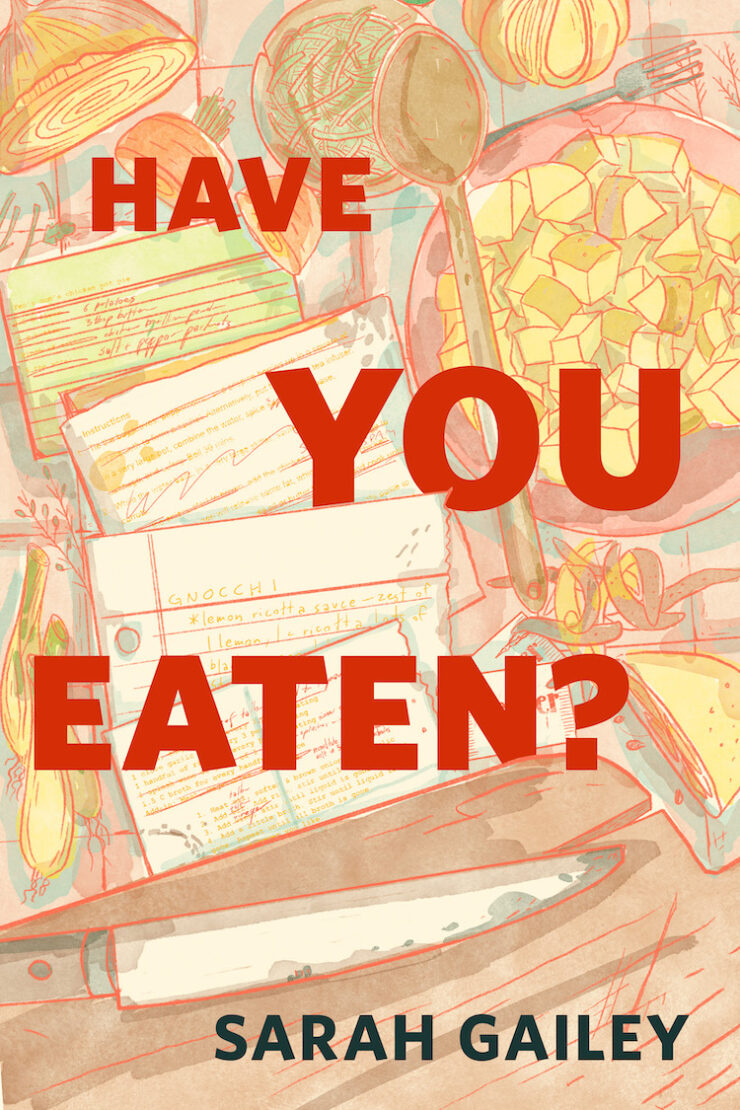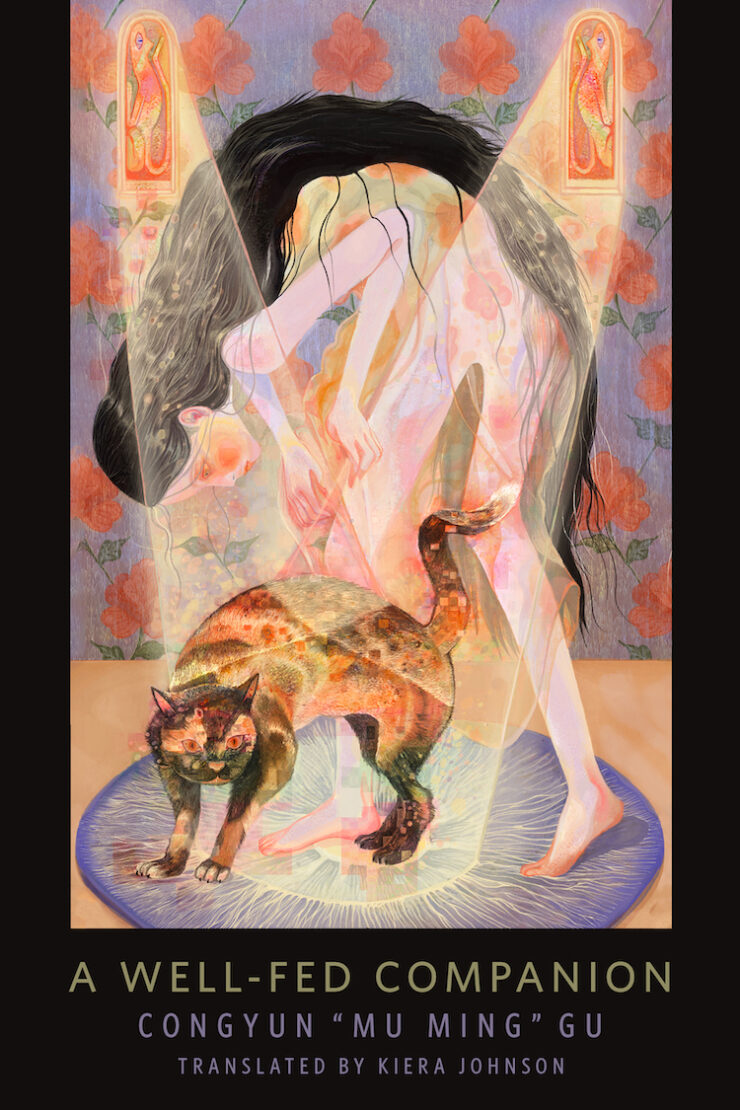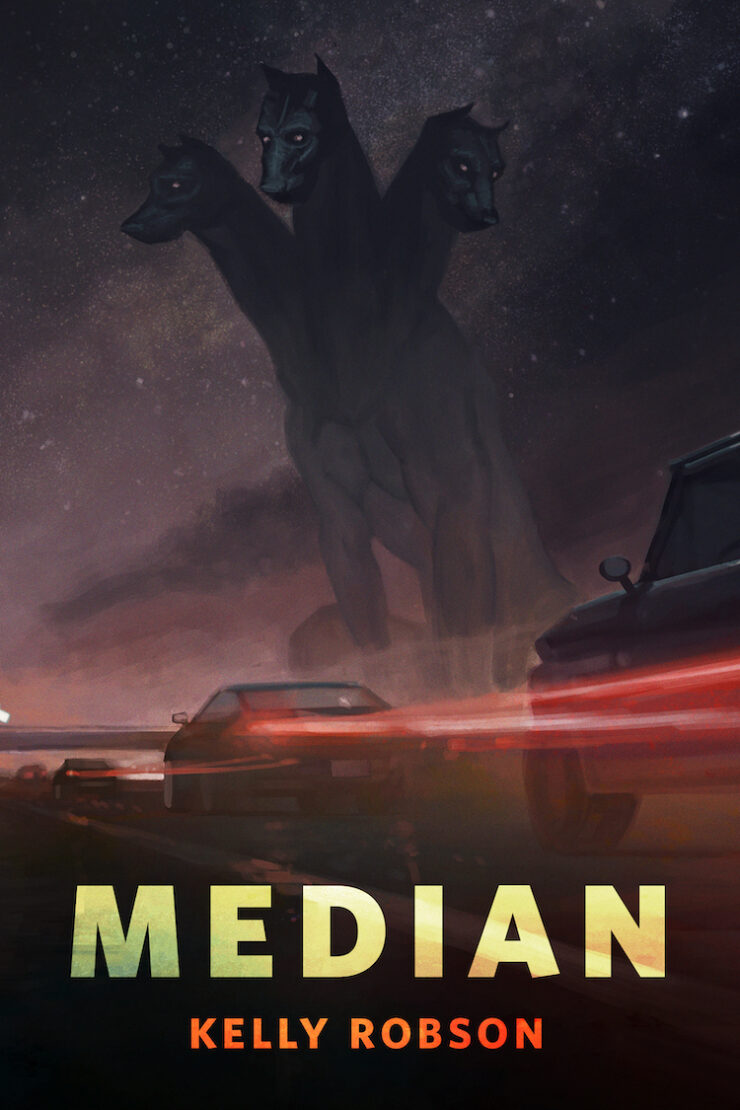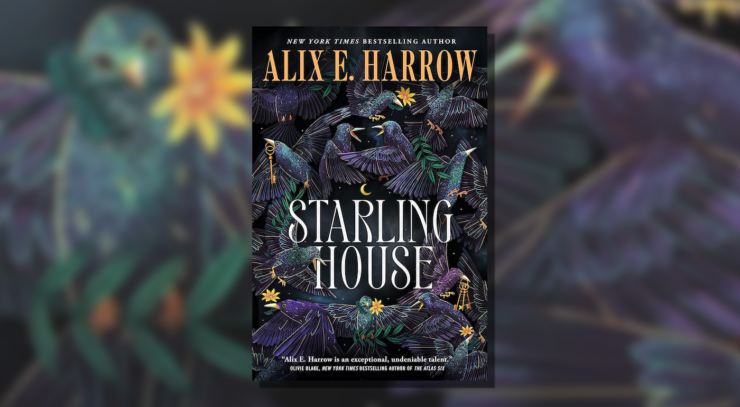I dream sometimes about a house I’ve never seen…
We’re thrilled to share an excerpt from Starling House by Alix E. Harrow, out from Tor Books on October 3.
I dream sometimes about a house I’ve never seen…
Opal is a lot of things—orphan, high school dropout, full-time cynic and part-time cashier—but above all, she’s determined to find a better life for her younger brother Jasper. One that gets them out of Eden, Kentucky, a town remarkable for only two things: bad luck and E. Starling, the reclusive nineteenth century author of The Underland, who disappeared over a hundred years ago.
All she left behind were dark rumors—and her home. Everyone agrees that it’s best to ignore the uncanny mansion and its misanthropic heir, Arthur. Almost everyone, anyway.
I should be scared, but in the dream I don’t hesitate.
Opal has been obsessed with The Underland since she was a child. When she gets the chance to step inside Starling House—and make some extra cash for her brother’s escape fund—she can’t resist.
But sinister forces are digging deeper into the buried secrets of Starling House, and Arthur’s own nightmares have become far too real. As Eden itself seems to be drowning in its own ghosts, Opal realizes that she might finally have found a reason to stick around.
In my dream, I’m home.
And now she’ll have to fight.
Welcome to Starling House: enter, if you dare.
It’s a gray Tuesday evening in February and I’m on my way back to the motel after a pretty shitty day.
I don’t know what made it so shitty; it was more or less exactly the same as the days that preceded it and the days likely to follow it, a featureless expanse of hours interrupted by two long walks in the cold, from the motel to work and back. It’s just that I had to work eight entire hours with Lacey Matthews, the human equivalent of unsalted butter, and when the drawer came up short at the end of our shift the manager gave me an I’ve-got-my-eye-on-you glare, as if he thought the discrepancy was my fault, which it was. It’s just that it snowed yesterday and the dismal remains are rotting in the gutters, soaking through the holes in my tennis shoes, and I made Jasper take the good coat this morning. It’s just that I’m twenty-six years old and I can’t afford a goddamn car.
I could’ve gotten a ride from Lacey or her cousin Lance, who works nights at the call center. But Lacey would proselytize at me and Lance would pull over on Cemetery Road and reach for the top button of my jeans, and I would probably let him, because it would feel pretty good and the motel was pretty far out of his way, but later I would catch the scent of him on my hoodie—a generic, acidic smell, like the yellow cakes of soap in gas station bathrooms—and feel an apathy so profound, so perfectly flat, that I would be tempted to pull out that grocery bag beneath the bed just to make sure I could still feel anything at all.
So: I’m walking.
It’s four miles from Tractor Supply to the motel—three and a half if I cut behind the public library and cross the river on the old railroad bridge, which always puts me in a strange, sour mood.
Buy the Book
Starling House
I pass the flea market and the RV park, the second Dollar General and the Mexican place that took over the old Hardee’s building, before I cut off the road and follow the railroad tracks onto Gravely land. At night the power plant is almost pretty, a great golden city lit up so bright it turns the sky yellow and throws a long shadow behind you.
The streetlights are humming. The starlings are murmuring. The river is singing to itself.
They paved the old railroad bridge years ago, but I like to walk on the very edge, where the ties stick out. If you look down you can see the Mud River rushing in the gaps, a black oblivion, so I look up instead. In summer the banks are so knotted with honeysuckle and kudzu you can’t see anything but green, but now you can see the rise and fall of the land, the indentation of an old mine shaft.
I remember it as a wide-open mouth, black and gaping, but the city boarded it up after some kids dared each other past the danger signs. People had done it plenty of times before, but the mist rose high that night—the mist in Eden comes dense and fast, so heavy you can almost hear it padding along beside you—and one of them must have gotten lost. They never did find the body.
The river sings loud now, siren sweet, and I find myself humming along with it. I’m not truly tempted by the cold black of the water below—suicide is a folded hand and I’m no quitter—but I can remember how it felt down there among the bones and bottom-feeders: so quiet, so far beyond the scrabbling, striving, grinding work of survival.
It’s just that I’m tired.
I’m pretty sure this is what Mr. Cole, the high school guidance counselor, might call a “crisis point” when I ought to “reach out to my support network,” but I don’t have a support network. I have Bev, owner and manager of the Garden of Eden Motel, who is obligated to let us live in room 12 rent-free because of some shady deal she cut with Mom, but isn’t obligated to like it. I have Charlotte, local librarian and founder of the Muhlenberg County Historical Society, who was nice enough not to ban me after I faked a street address to get a library card and sold a stack of DVDs online. Instead she merely asked me to please not do it again and gave me a cup of coffee so sweet it made my cavities ache. Other than them it’s just the hellcat—a vicious calico who lives under the motel dumpster—and my brother.
I wish I could talk to Mom. She gave terrible advice, but I’m almost as old now as she was when she died; I imagine it would be like talking to a friend.
I could tell her about Stonewood Academy. How I transferred Jasper’s transcripts and filled out all the forms, and then sweet-talked them into saving him a spot next term so long as I pay the tuition by the end of May. How I assured them it wouldn’t be a problem, talking bright and easy like she taught me. How I have to quadruple my life savings in the next three months, on the kind of minimum-wage job that carefully keeps you under thirty hours a week so they don’t have to give you health insurance.
But I’ll find a way, because I need to, and I’ll walk barefoot through hell for what I need.
My hands are cold and blue in the light of my phone. hey punk how’s the book report going
great, Jasper writes back, followed by a frankly suspicious number of exclamation points.
oh yeah? what’s your thesis statement? I’m not really worried—my little brother has an earnest, determined brilliance that’s won over every teacher in the public school system, despite their expectations about boys with brown skin and curls—but hassling him makes me feel better. Already the river sings softer in my skull.
my thesis is that I can fit fourteen marshmallows in my mouth at once
and everyone in this book needs a long sitdown with mr cole
I picture Heathcliff hunched in one of the counselor’s undersized plastic chairs, an anger-management brochure crumpled in his hands, and feel a weird twist of sympathy. Mr. Cole is a nice man, but he doesn’t know what to do with people raised on the underside of the rules, where the world turns dark and lawless, where only the canny and cruel survive.
Jasper isn’t canny or cruel, which is only one of the several hundred reasons I have to get him out of here. It ranks right below the air quality and the Confederate flags and the bad luck that slinks behind us like a mean dog, nipping at our heels. (I don’t believe in curses, but if there was such a thing as a cursed family, it would look a lot like us.)
that’s not a thesis. My fingers snag on the cracks that spiderweb across my screen.
i’m sorry what did you get in 10th grade english again??
My laugh hangs in the air, ghostly white. i graduated with a 4.0 from the School of Fuck You
A tiny pause. chill. it’s job fair tomorrow, nobody’s collecting essays
I despised the job fair when I was at school. There aren’t really any jobs around here except breathing particulates at the power plant, so it’s just an AmeriCorps booth and somebody from the Baptist mission group handing out flyers. The main excitement comes at the end, when Don Gravely, CEO of Gravely Power, takes the stage and gives an excruciating speech about hard work and the American spirit, as if he didn’t inherit every cent of his money from his big brother. We all had to shake his hand as we filed out of the gym, and when he got to me he flinched, as if he thought poverty might be contagious. His palm had felt like a fresh-peeled boiled egg.
Imagining Jasper shaking that clammy-ass hand makes my skin feel hot and prickly. Jasper doesn’t need to listen to any bullshit speeches or take home any applications, because Jasper isn’t getting stuck in Eden.
i’ll call miss hudson and say you have a fever, screw the job fair
But he replies: nah I’m good
There’s a lull in our conversation while I leave the river behind and wind uphill. The electric lines swoop overhead and the trees crowd close, blotting out the stars. There are no streetlights in this part of town.
where are you now? im hungry
A wall runs beside the road now, the bricks pocked and sagging with age, the mortar crumbling beneath the wheedling fingers of Virginia creeper and poison ivy. just passing the starling place
Jasper replies with a smiley face shedding a single tear and the letters RIP.
I send him the middle-finger emoji and slide my phone back in my hoodie pocket.
I should hurry back. I should keep my eyes on the painted white stripe of the county road and my mind on Jasper’s savings account.
But I’m tired and cold and weary in some way that’s deeper than muscle and bone. My feet are slowing down. My eyes are drifting up, searching through the twilit woods for a gleam of amber.
There it is: a single high window glowing gold through the dusk, like a lighthouse that wandered too far from the coast.
Except lighthouses are supposed to warn you away, rather than draw you closer. I hop the gully at the side of the road and run my hand along the wall until the brick gives way to cold iron.
The gates of Starling House don’t look like much from a distance—just a dense tangle of metal half-eaten by rust and ivy, held shut by a padlock so large it almost feels rude—but up close you can make out individual shapes: clawed feet and legs with too many joints, scaled backs and mouths full of teeth, heads with empty holes for eyes. I’ve heard people call them devils or, more damningly, modern art, but they remind me of the Beasts in The Underland, which is a nice way of saying they’re unsettling as all hell.
I can still see the shine of the window through the gate. I step closer, weaving my fingers between the open jaws and curling tails, staring up at that light and wishing, childishly, that it was shining for me. Like a porch light left on to welcome me home after a long day.
I have no home, no porch light. But I have what I need, and it’s enough.
It’s just that, sometimes, God help me, I want more.
I’m so close to the gate now that my breath pearls against the cold metal. I know I should let go—the dark is deepening and Jasper needs dinner and my feet are numb with cold—but I keep standing, staring, haunted by a hunger I can’t even properly name.
It occurs to me that I was right: dreams are just like stray cats. If you don’t feed them they get lean and clever and sharp-clawed, and come for the jugular when you least expect it.
I don’t realize how tight I’m gripping the gate until I feel the bite of iron and the wet heat of blood. I’m swearing and wadding the sleeve of my hoodie against the gash, wondering how much the health clinic charges for tetanus shots and why the air smells suddenly rich and sweet—when I realize two things simultaneously.
First, that the light in the window has gone out.
And second, that there is someone standing on the other side of the gates of Starling House.
There are never any guests at Starling House. There are no private parties or visiting relatives, no HVAC repair vans or delivery trucks. Sometimes in a fit of hormonal frustration a pack of high schoolers will talk about climbing the wall and sneaking up to the house itself, but then the mist rises or the wind blows sideways and the dare is never quite made. Groceries are piled outside the gate once a week, the milk sweating through brown paper sacks, and every now and then a sleek black car parks across the road and idles for an hour or two without anyone getting in or out. I doubt whether any outsider has set foot on Starling land in the last decade.
Which means there’s exactly one person who could be standing on the other side of the gate.
The latest Starling lives entirely alone, a Boo Radley–ish creature who was damned first by his pretentious name (Alistair or Alfred, no one can ever agree which), second by his haircut (unkempt enough to imply unfortunate politics, when last seen), and third by the dark rumor that his parents died strangely, and strangely young.
But the heir to Starling House doesn’t look like a rich recluse or a murderer; he looks like an underfed crow wearing a button-up that doesn’t quite fit, his shoulders hunched against the seams. His face is all hard angles and sullen bones split by a beak of a nose, and his hair is a tattered wing an inch shy of becoming a mullet. His eyes are clawing into mine.
I become aware that I’m staring back at him from a feral crouch, like a possum caught raiding the motel dumpsters. I wasn’t doing anything illegal, but I don’t have a fantastic explanation for why I’m standing at the end of his driveway just after dusk, and there’s a fifty-fifty chance he actually is a murderer, so I do what Mom did whenever she got herself in a tight spot, which was every day: I smile.
“Oh, I didn’t see you there!” I clutch my chest and give a girly little laugh. “I was just passing by and thought I’d take a closer look at these gates. They’re so fancy. Anyway, I didn’t mean to bother you, so I’ll head on my way.”
The heir to Starling House doesn’t smile back. He doesn’t look like he’s ever smiled at anything, actually, or ever will, as if he were carved from bitter stone rather than born in the usual way. His eyes move to my left hand, where the blood has soaked through the wadded sleeve to drip dramatically from my fingertips. “Oh, shit.” I make an abortive effort to shove the hand into my pocket, which hurts. “I mean, that’s nothing. I tripped earlier, see, and—”
He moves so quickly I barely have time to gasp. His hand darts through the gate and catches mine, and I know I should snatch it back—when you grow up on your own from the age of fifteen you learn not to let strange men grab ahold of any part of you—but there’s an enormous padlock between us and his skin is so warm and mine is so damn cold. He turns my hand palm up in his and I hear a low hiss of breath.
I lift one shoulder. “It’s fine.” It’s not fine: my hand is gummy mess of red, the flesh gaping in a way that makes me think superglue and peroxide might be insufficient. “My brother will patch me up. He’s waiting for me, by the way, so I really should get going.”
He doesn’t let go. I don’t pull away. His thumb hovers over the jagged line of the cut, not-quite-touching it, and I realize abruptly that his fingers are trembling, shaking around mine. Maybe he’s one of those people who faint at the sight of blood, or maybe eccentric recluses aren’t accustomed to young women bleeding all over their front gates.
“It’s no big deal.” I don’t generally do sincerity, except for Jasper, but I feel a certain sympathy for him. Or it might be symmetry: he’s about my age, underdressed and shivering, hated by half the town. “I’m really fine.”
He looks up, and as I meet his eyes I know with sudden and terrible clarity that I was mistaken. His hands aren’t shaking with nerves or cold: they’re shaking with rage.
His skin is bloodless, stretched tight over the bleak bones of his face, and his lips are peeled away from his teeth in an animal snarl. His eyes are the starless black of caves.
I reel back as if shoved, my smile abandoned, my good hand fumbling for the motel key in my pocket. He might be taller but I’d bet money I fight dirtier.
But he doesn’t open the gate. He leans closer, forehead pressing hard against the iron, fingers wrapping whitely around the bars. My blood is slick and shining across his knuckles.
“Run,” he grates.
I run.
Hard and fast, with my left hand curled tight to my chest, still throbbing, but not quite as cold as it was before.
The heir to Starling House watches her run from him, and does not regret it.
He doesn’t regret the way she ripped her hand from his, or the way her eyes flashed at him before she ran, hard and flat as beaten nails. He especially does not regret the sudden departure of that bright, bold smile, which had never been real in the first place.
He wrestles with a brief, absurd urge to shout after her—wait, he might say, or maybe even come back—before he reminds himself that he doesn’t want her to come back at all. He wants her to run and keep running, as fast and far as she can. He wants her to pack her things and buy a Greyhound ticket at the Waffle House and ride out of Eden without looking back once.
She won’t do it, of course. The House wants her, and the House is stubborn. Already her blood has vanished from the gate as if an invisible tongue licked it clean.
He doesn’t know why it would want her, of all people: a freckled scarecrow of a girl with crooked teeth and holes in the knees of her jeans, entirely unremarkable except for the steel in her eyes. And perhaps for the way she stood her ground against him. He is a ghost, a rumor, a story whispered after the children have gone to bed, and she was cold and hurt, all alone in the rising dark—and yet she hadn’t run from him until he told her to. The House has always had a taste for the brave ones.
But Arthur Starling swore on his parents’ graves that he would be the last Warden of Starling House. He is many things—a coward, a fool, a terrible failure—but he is not a man to break his word. No one else will lie awake every night listening for the scrape of claws and the pant of breath. No one else will spend their lives fighting an invisible war, rewarded either with the silence of victory or the too-high cost of failure. No one else will bear the Starling sword after him.
Certainly not a scrawny girl with hard eyes and a liar’s smile.
Arthur unpeels his forehead from the gate and turns away, his shoulders hunched in a manner that would have made his mother narrow her eyes, if she still had eyes to narrow.
The walk back to the House takes longer than it ought to, the drive twisting and coiling more than it should, the ground rougher and the night darker. His legs are aching by the time he steps across the threshold of the House.
He pauses to rest a hand on the doorframe. Her blood cracks and flakes from his skin. “Leave her be,” he says softly. They haven’t addressed one another in civil terms for years, but for some reason he’s compelled to add a single, stiff “Please.”
The floorboards creak and wail. A petulant door slams down some distant hall.
Arthur slouches upstairs and falls into bed fully clothed but still shivering, half expecting a pipe to spring a spiteful leak above his pillow, or a loose shutter to slap arrhythmically against a sill.
Instead, there are only the dreams. Always, the damn dreams.
He is five, and the House is whole and hale. There are no cracks in the plaster, no broken balusters or dripping faucets. To Arthur, it is not a house so much as a country, an endless map made up of secret rooms and creaking stairs, leaf-shadowed floorboards and sun-faded armchairs. Every day he goes exploring, fortified by the peanut-butter-and-jellies his father packs him, and every night the starlings sing him to sleep. He does not even know how lonely he is.
He is eight, and his mother is shaping his fingers around the hilt, straightening his thin wrists when they want to bend. You love our home, don’t you? Her face is grave and tired. She was always tired. You have to fight for what you love.
Arthur wakes then, sweating, and does not sleep again. He stares out the round window of his attic room, watching the silver sway of the trees, thinking of his mother, of all the Wardens before her—of the girl.
His last, hopeful thought before dawn is that there was a cleverness to her, a canniness, and surely only the very worst of fools would ever return to Starling House.
Excerpted from Starling House, copyright © 2023 by Alix E. Harrow.










